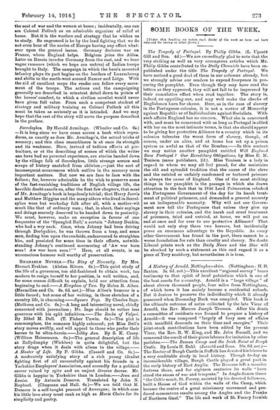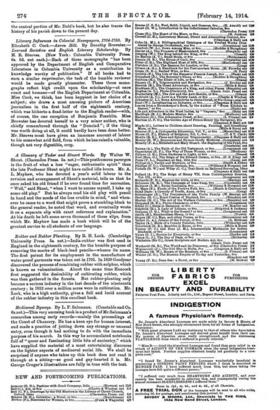A History of Arnold, Nottinghamshire. (Nottingham H. B. Saxton. 3s.
6d. net.)—This excellent "regional survey" bears testimony to that spirit of local patriotism which ie one of the best assets for a country. Arnold is a " large village" of about eleven thousand people, four miles from Nottingham, of which town it has mainly become a residential suburb. But it desires to preserve the individuality which it already possessed when Doomsday Book was compiled. This book is the ultimate outcome of notes collected by the late Vicar of Arnold, the Rev. Marcus Joseph Truman. After his death a committee of residents was formed to prepare a history of Arnold—it was composed "largely of busy men of affairs with manifold demands on their time and energies." Their joint-stock contributions have been edited by the present Vicar, the Rev. R. W. King, and Mr. John Russell, and we commend the result of their pious labours for imitation by other parishes.—The Roman Camp and the Irish Saint at Burgh Castle. By Louis H. Dahl. (Jerrold and Sons. 10s. 6d. net)— The Rector of Burgh Castle in Suffolk use devoted his leisure to a very creditable study in local history. Though to-day an inconsiderable village, Burgh Castle played a great part in the early history of East Anglia. The Romans left a massive fortress there, and for eighteen centuries its walls "have stood the stress of war and tempests." In Anglo-Saxon times "the Celtic monk, St. Fursey, assisted by his devoted followers, built a House of God within the walls of the Camp, which became the centre of a great missionary movement and pro- duced momentous results among the Angles and the Franks of Northern Gaul." The life end work of St. Fursey furnish
the central portion of Mr. Dahre book, but he also traces the history of his parish down to the present day.







































 Previous page
Previous page